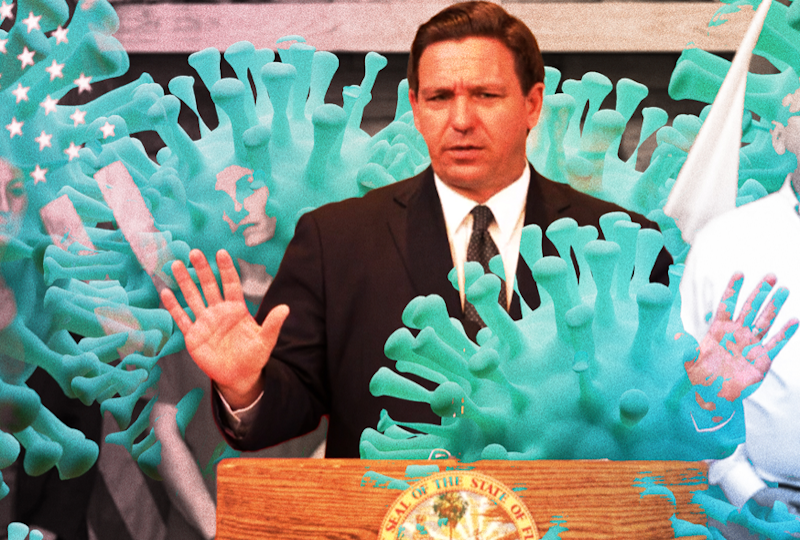Whether DeSantis will or should beat Trump in the Republican primaries is debatable, but there’s one way he likely could, even after his launch event’s tech glitches. That’s by tapping into Republican voters’ fury at pandemic rules, rules begun under Trump but largely resisted by Gov. DeSantis and Florida.
Reasonable people, if you’re able to find any, can disagree about the severity of Covid and the aptness of the response to it, but they can’t deny the liberty-restricting side effects, and it’s plain both halves of the body politic are suddenly keen to leave it all behind. Supreme Court justice Neil Gorsuch wrote this month that over the three years of the pandemic just ended “we may have experienced the greatest intrusions on civil liberties in the peacetime history of this country.”
Gorsuch was appointed by Trump, but he reaffirmed his libertarian, as opposed to merely conservative, leanings by pointing with particular alarm to Covid rules’ ad hoc use in restricting immigration—not that the press will thank him for doing so. Whether laws are used for left-favored or right-favored ends, though, no one should celebrate when the laws are bent in unintended and unpredictable ways to achieve otherwise controversial ends.
By the time World Health Organization director Tedros Adhanom Ghebreyesus declared the three-year pandemic over on May 5, nearly seven million people around the world had purportedly died from the disease, about one in 1000 humans, which is no small thing. Then again, before you take that as reason to let government do whatever it thinks best in an emergency, recall that governments (and not just the fascists) murdered about one in 10 human beings during the 20th century, yet few people think of big government as a serious health threat.
Far from learning humility from it all, the WHO now openly plans to apply plague lessons to speech disputes, using “infodemic” models and widespread listening surveillance to track “misinformation” in the populace and nudge the public in preferred directions.
Public relations coordination of messaging on all sorts of topics is routine—but still in some sense a conspiracy. Let’s retire that word, then, not because it never applies but because it’s merely descriptive in our dystopian reality, no longer either a shock or a useful pejorative. Call the Covid messaging helpful or hurtful, it was arguably the biggest and most global propaganda campaign mounted since the creation, almost exactly 100 years earlier, of the modern Progressive P.R. apparatus, first employed to stoke World War I under Princeton-minted President Woodrow Wilson.
Who knew that what began with antiwar anarchists’ subversive pamphlets being confiscated for indirectly helping the Kaiser would lead a century later to things like a Fox News producer admitting in a recording made by reporter James O'Keefe that that network is beholden to Pfizer and thus unable to resist the Covid narrative?
Admittedly far smaller and more local—but still troubling—purported information missteps during the strange past three years include Nashville officials concealing the low number of detected Covid cases in bars and restaurants, as if to maintain an atmosphere of fear, the way government does with so many other real-but-also-paranoia-stoking hobgoblins.
The first impulse of big-city sophisticates like my fellow New Yorkers in recent years would probably be to scoff at the Tennessee hicks for bungling, but that’s harder to do with mounting evidence big cities’ even firmer lockdown policies saved no extra lives but did vastly more damage to business and employment. Sane liberals would extrapolate from such a debacle to question all regulation at all times—but they won’t. Regulation is their stern, authoritarian religion, perhaps now more than ever.
Fear—whether of terrorism, immigration, plague, or whatever comes next—shrinks our world almost literally. We went in the first two decades of this century from celebrating the potential of outer space to a militarized globalism under Bush, then a more constricted nationalism under Trump, then a newfound interest in closable individual state borders in the early stages of Covid, then to speculative talk of permanent in-home lockdowns or business shutdowns, maybe even over non-plague issues such as environmental effects.
If they locked each of us in a clear plastic tube at this point, some kids wouldn’t even notice anything was wrong, having in recent years endured things like all their teachers addressing them via video screens while the kids are limited to classrooms of four students each, with each student instructed to remain in a two-foot-square space on the floor, which can be exited only for highly structured bathroom breaks, having to push their desks out of those squares if they want to stretch for a minute, as one parent I know recounts.
You can pretend it’s mere coincidence that each political crisis our society has faced this century has yielded a smaller and more constricted control grid—each step sounding like a logical response at the time—but you can’t deny the trend. It won’t get better as long as the public reacts with approval to politicians such as New Jersey Gov. Phil Murphy saying with undisguised fanaticism early in the pandemic that New Jersey must reach “zero” Covid deaths per day.
If it’s not Covid that gets used to justify such absolutism, next it’ll be fentanyl or some other excuse. If DeSantis—or someone—touts his credentials as a liberator from all such crusades instead of just a different, ambiguous flavor of autocrat or technocrat, Americans might cheer with relief. What seems very safe, in any case, is the bet that Republican primary voters would cheer.
—Todd Seavey is the author of Libertarianism for Beginners and is on Twitter at @ToddSeavey

